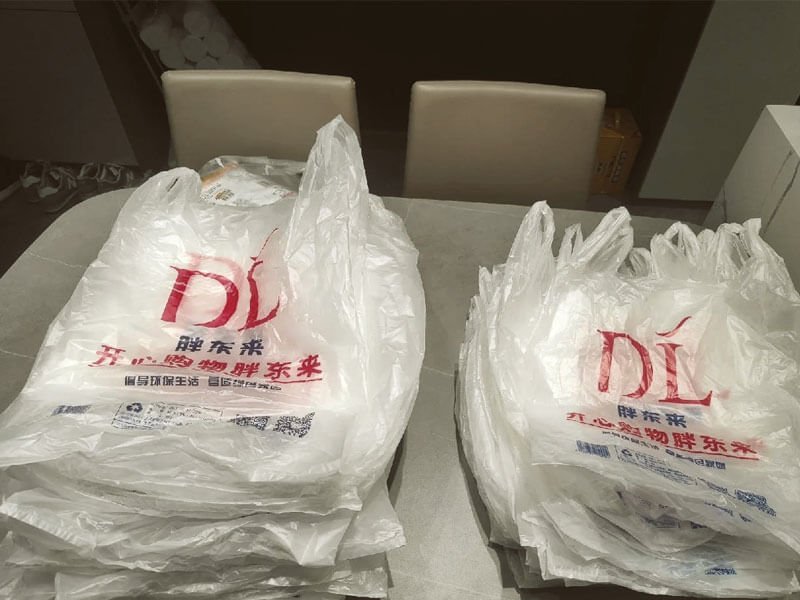When you buy a "biodegradable" shopping bag at the supermarket checkout, have you ever wondered: Is it truly environmentally friendly? How is it different from a regular supermarket bag? Can it be thrown directly into the trash after use?
There are many articles online about biodegradable materials, but none explain them clearly. As a manufacturer of biodegradable and compostable bags, we'll provide you with detailed information on supermarket shopping bags and a clear, actionable "ultimate action guide." Your supposed environmental contribution may not ultimately translate as you expected.

What Are Biodegradable Carrier Bags
Biodegradable plastic bags: Most of the "eco-friendly bags" currently promoted by supermarkets fall into this category. They are made from bio-based or petroleum-based biodegradable materials such as PLA (polylactic acid, derived from corn starch, etc.) and PBAT. Under specific industrial composting conditions—consistent high temperatures (50-60°C), high humidity, and the presence of specialized microbial communities—they can be broken down by microorganisms into carbon dioxide and water within 180 days.
Ordinary plastic bags:
These are transparent or colored plastic bags primarily made of polyethylene (PE). Derived from petroleum, they take hundreds of years to decompose in the natural environment and are a major source of plastic pollution.
Do environmentally friendly plastic bags disappear simply by being thrown into the soil or ocean?
On the contrary, in normal natural environments (such as soil, rivers, and oceans), biodegradable shopping bags degrade very slowly. Physical forces break them down into countless "microplastics," which enter the food chain and pose a potential threat to ecosystems and human health.
Carelessly discarding a biodegradable bag can cause similar pollution as a regular plastic bag.
Supermarket Current Situation and Policy Background
As the country transitions from a "plastic restriction" to a "plastic ban," supermarkets are starting to charge for biodegradable plastic bags. This is intended to encourage the public to reduce their use of single-use plastics, but the key question is whether there are industrial composting facilities at the back end.

What Category of Waste Do Biodegradable Plastic Carrier Bags Fall Into?
In most Chinese cities, industrial composting facilities are not yet widely available. The best way to dispose of used fully biodegradable plastic bags is to place them in the "other garbage" (or "dry garbage") bin.
- The dangers of mistakenly placing them in the "recyclables" bin: They can contaminate the recycling chain for traditional plastics like PE and PP, causing the entire batch of recyclable plastic to be downgraded or even rendered useless.
- The frustration of mistakenly placing them in the "kitchen waste" bin: Even though they are theoretically compostable, most kitchen waste treatment plants in China currently use anaerobic fermentation or feed processing, not high-temperature aerobic composting processes designed for degrading materials like PLA and PBAT. Therefore, these bags cannot be effectively decomposed in these processes.
- Placing them in the "other garbage" bin is the best option: they will eventually be incinerated for power generation or landfilled. During incineration, the organic components they contain can be converted into heat, enabling resource utilization. Even if they are landfilled, they are kept in a relatively controlled environment.
Canvas Bags Vs. Paper Bags Vs. Biodegradable Bags
| Bag Type | Key Advantages | Key Disadvantages | Environmental Break-Even Point (Reuses needed to offset production impact) |
| Fully Biodegradable Plastic Bag | Can return to nature under specific conditions | Highly dependent on industrial composting; can generate microplastics | (Single-use, high environmental cost) |
| Paper Bag | Renewable and recyclable | Production is water and energy-intensive; poor durability | At least 3 - 7 times |
| Non-Woven Bag (PP) | Durable and low-cost | Essentially plastic, difficult to recycle, releases microplastics when washed | At least 14 times |
| Cotton / Canvas Tote Bag | Extremely durable, natural material | Cotton farming is extremely water and pesticide-intensive | At least 131 times (for organic cotton) to thousands of times (for conventional cotton) |
How to Identify "Fake Environmental Protection" And "Greenwashing"?
Businesses use various gimmicks to market themselves as "environmentally friendly." How can we avoid being "greenwashed"?
Be wary of "oxo-degradable" bags: These bags contain additives added to traditional plastics. These bags break down into uncollectible microplastics when exposed to light and air, making them even more harmful and subject to strict restrictions in the EU and other regions.
How to identify:
- Look for the words "fully biodegradable." Be wary of vague terms like "degradable," "environmentally friendly," or "biodegradable."
- Look for the standard: Look for the national standard number printed on the bag. The most authoritative standard in China is GB/T 38082-2019, "Biodegradable Plastic Shopping Bags." The US uses BPI and ASTM D6400, the EU uses EN 13432, TUV Austria uses OK Compost Industrial or OK Compost Home, and Australia and New Zealand use AS 4736 and AS 5810.
- Feel/smell (auxiliary): Fully biodegradable bags typically feel softer and smoother, with a light cornstarch or plant-based fragrance.

How to Become a True Plastic Reductionist
To truly achieve significant environmental impact, start at the source.
- Reduce Plastic at the Source
When Shopping: Use foldable cloth or paper shopping bags. Prioritize loose vegetables and fruits that aren't pre-packaged. Alternatively, you can use your own plastic containers for prepared foods, fresh meat, and more. Vegetables like potatoes and onions can be placed in the shopping basket.
- Reuse
After using supermarket plastic bags, don't throw them away immediately. Use them as trash bags, storage bags, and other storage bags at home to maximize their useful life and reuse them multiple times.
- Mobilize Your Community, From Individuals to Communities
When you share the information in this article with your family and friends, and when you discuss the correct way to sort your waste on social media, you're driving positive change.
Conclusion:
Are supermarket shopping bags biodegradable? The answer is: Yes, but only under certain environmental conditions.
"Fully biodegradable shopping bags" are not a panacea; their environmental value is highly dependent on the lack of industrial composting systems. Currently, the most responsible way to sort waste is to place it in the "Other Trash/Dry Waste" bin.
True environmental protection begins with awareness of plastic reduction at the source and small actions every time you shop. Make smarter, more responsible choices. Please share this article with those you care about so that more people can understand the truth behind plastic shopping bags.





